- Home
- Robert B. Parker
Stone Cold js-4
Stone Cold js-4 Read online
Stone Cold
( Jessie Stone - 4 )
Robert B Parker
Stone Cold - Parker
Stone Cold - Parker
Stone Cold
By
Robert
B. Parker
FOR JOAN:
everything started to hum
1
After the murder, they made love in front of a video camera.
When it was over, her mouth was bruised. He had long scratches across his back. They lay side by side on their backs, gasping for breath.
“Jesus!” he said, his voice hoarse.
“Yes,” she whispered.
She moved into the compass of his left arm and rested her head against his chest. They lay silently for a while, not moving, waiting for oxygen.
“I love you,” he said.
“I love you too,” she said.
He put his face down against the top of her head where it lay on
his chest. Her hair smelled of verbena. In time their breathing settled.
“Let’s play the video,” she
whispered.
“Let’s,” he said.
The camera stood beside the bed on a tripod. He got up, took the
tape from it, put it in the VCR, got back into bed, and picked up the remote from the night table. She moved back into the circle of his arm, her head back on his chest.
“Show time,” he said, and clicked the remote.
They watched.
“My God,” she said. “Look at
me.”
“I love how you’re looking right into the camera,” he
said.
They watched quietly for a little while.
“Whoa,” she said. “What are you
doing to me
there?”
“Nothing you don’t like,” he
said.
When the tape was over he rewound it.
“You want to watch again?” he said.
She was drawing tiny circles on his chest with her left forefinger.
“Yes.”
He started the tape again.
“You know what I loved,” she said.
“I loved the range of
expression on his face.”
“Yes,” he said, “that was great.
First it’s like, what the
hell is this?”
“And then like, are you serious?”
“And then, omigod!”
“That’s the best,” she said.
“The way he looked when he knew we
were going to kill him. I’ve never seen a look like that.”
“Yes,” he said. “That was pretty
good.”
“I wish we could have made it last
longer,” she
said.
He shrugged.
“My bad,” she said. “I got so
excited. I shot too
soon.”
“I’ve been known to do that,” he
said.
“Well, aren’t you Mr. Dirty
Mouth,” she said.
They both laughed.
“We’ll get better at it,” he
said.
She was now rubbing the slow circles on his chest with her full
palm, looking at the videotape.
“Ohhh,” she said. “Look at me!
Look at me!”
He laughed softly. She moved her hand down his stomach.
“What’s happening here?” she
said.
He laughed again.
“Ohh,” she said. “Good
news.”
She turned her body hard against him and put her face up.
“Be careful,” she murmured. “My
mouth is sore.”
They made love again while the image of their previous lovemaking moved unseen on the television screen, and the sounds of that mingled with the sounds they were making now.
2
It was just after dawn. Low tide. Several herring gulls hopped on the beach, their heads cocking one way then another, their flat black eyes looking at the corpse. Jesse Stone, with the blue light flashing, pulled into the public beach parking lot at the end of the causeway from Paradise Neck, parked behind the Paradise Police cruiser that was already there, and got out of his car. It was mid November and cold. Jesse closed the snaps on his Paradise Men’s
Softball League jacket and walked to the beach, where Suitcase Simpson, holding a big Mag flashlight, stood looking down at the body.
“Guy’s been shot, Jesse,” he
said.
Jesse stood beside Simpson and looked down at the body.
“Who found him?”
“Me. I’m on eleven to seven and I pulled in here to, ah, take a
leak, you know, and the headlights picked him up.”
Simpson was a big shapeless red-cheeked kid who’d played tackle
in high school. His real name was Luther but everyone called him Suitcase after the ballplayer.
“Peter Perkins coming?”
“Anthony’s on the night desk,”
Simpson said. “He told me he’d
call him soon as he called you.”
“Okay, gimme the flashlight. Then go pull your cruiser across
the entrance to the parking lot and call in. When Molly comes on I want Anthony down here and everybody else she can wrangle. I want the area secured.”
Simpson hesitated, still looking down.
“It’s a murder, isn’t it,
Jesse?”
“Probably,” Jesse said. “Gimme
the light.”
Simpson handed the flashlight to Jesse and went to his cruiser.
Jesse squatted on his heels and studied the corpse. It had been a young white man, maybe thirty-five. His mouth was open. There was sand in it. He wore a maroon velour warm-up suit, which was soaking wet. There were two small holes in the wet fabric. One on the left side of the chest. One on the right. Jesse turned the head slightly. There was sand in his ear. Jesse swept the flashlight slowly around the body. He saw nothing but the normal debris of a normal beach: a tangle of seaweed scraps, a piece of salt-bleached driftwood, an empty crab shell.
Simpson walked back across the parking lot. Behind him the blue
light on his patrol car revolved silently.
“Perkins is on the way,” he said.
“And Arthur Angstrom. Anthony
called Molly. She’s coming in early. Anthony’ll be down as soon as
she gets there.”
Jesse nodded, still looking at the crime scene.
He said, “What time is it, Suit?”
“Six-fifteen.”
“And it’s dead low tide,” Jesse
said. “So high was around
midnight.”
A siren sounded in the distance.
“You think he was washed up here?” Simpson said.
“Body that’s been in the ocean and washed up on shore doesn’t
look like this,” Jesse said.
“More beat up,” Simpson said.
Jesse nodded.
“He’s got some marks on his
face,” Simpson said.
“That would probably be the gulls,” Jesse said.
“I coulda lived without knowing that,”
Simpson
said.
Jesse moved the right arm of the corpse. “Still in rigor,” he
said.
“Which means?”
“Rigor usually passes in twenty-four hours,” Jesse
said.
“So he was killed since yesterday morning.”
“More or less. Cold water might change the timing a little.”
blue light to his. Peter Perkins got out and walked toward them. He was carrying a black leather satchel.
“Anthony says you got a murder?” Perkins said.
“You’re the crime-scene guy,”
Jesse said. “But there’s two
bullet holes in his chest.”
“That would be a clue,” Perkins said.
He put the satchel on the sand and squatted beside Jesse to look
at the corpse.
“I figure he was probably shot here, sometime before midnight,”
Jesse said, “when the tide was still coming in.
There’s the high
water line. The tide reached high about midnight and soaked him, maybe rolled him around a little, and left him here when it receded.”
“If you’re right,” Perkins said,
“it probably washed away pretty
much any evidence might be lying around.”
“We’ll close the beach,” Jesse
said, “and go over
it.”
“It’s November, Jesse,” Simpson
said. “Nobody uses it
anyway.”
“This guy did,” Jesse said.
3
When he left the beach, Jesse called Marcy Campbell on his cell
phone.
“I’m up early fighting crime,”
Jesse said. “Got time for
breakfast?”
“It’s seven-thirty in the
morning,” Marcy said. “What if I’d
been asleep?”
“You’d be dreaming of me. When’s
your first
appointment.”
“I’m showing a house on Paradise Neck at eleven,” Marcy
said.
“I’ll come by for you.”
“I’m just out of the shower,”
Marcy said. “I’m not even
dressed.”
“Good,” Jesse said.
“I’ll hurry.”
Sitting across from Jesse in the Indigo Apple Cafe at 8:15, Marcy was completely put together. Her platinum hair was perfectly in place. Her makeup was flawless.
“You got ready pretty fast,” Jesse said.
“Crime busters float my boat,” Marcy said.
“What are you doing
so early.”
“Found a body on the beach,” Jesse said.
“Town beach?”
“Yes. He’d been shot twice.”
“My God,” Marcy said. “Who was
it.”
“Don’t know yet,” Jesse said.
“ME is looking at him
now.”
“Do you get help on major crimes like that?”
“If we need it,” Jesse said.
“Oh dear,” Marcy said.
“I’ve stepped on a
prickle.”
“We’re a pretty good little operation here,” Jesse said.
“Admittedly we don’t have all the resources of a big department.
State cops help us out on that.”
“And you don’t like it when that
happens.”
“I like to run my own show,” Jesse said.
“When I
can.”
The Indigo Apple had a lot of etched glass and blue curtains.
For breakfast it specialized in omelets with regional names.
Italian omelets with tomato sauce, Mexican omelets with cheese and peppers, Swedish omelets with sour cream and mushrooms. Jesse chose a Mexican omelet. Marcy ordered wheat toast.
“Speaking of which, how is the drinking?”
“Good,” Jesse said.
He didn’t like to talk about his drinking, even to Marcy.
“And the love life?” Marcy said.
“Besides you?”
“Besides me.”
“Various,” Jesse said.
“Well, doesn’t that make me feel
special,” Marcy
said.
“Oh God, don’t you get the vapors on me,” Jesse
said.
“No.” Marcy smiled. “I
won’t. We’re not lovers. We’re pals who fuck.”
“What are pals for,” Jesse said.
“It’s why we get along.”
“Because we don’t love each
other?”
“It helps,” Marcy said.
“How’s the ex-wife?”
“Jenn,” Jesse said.
“Jenn.”
Jesse leaned back a little and looked past Marcy through the etched glass front window of the cafe at people going by on the street, starting the day.
“Jenn,” he said again. “Well
… she doesn’t seem to be in
love with that anchorman anymore.”
“Was she ever?”
“Probably not.”
Marcy ate some toast and drank some coffee.
“She’s going out with some guy from
Harvard,” Jesse
said.
“A professor?”
The waitress stopped by the table and refilled their coffee cups.
“No, some sort of dean, I think.”
“Climbing the intellectual ladder,” Marcy said.
Jesse shrugged.
“You’ve been divorced like five
years,” Marcy
said.
“Four years and eleven days.”
Marcy stirred her coffee. “I’m older than you are,” Marcy
said.
“Which gives you the right to offer me advice,” Jesse
said.
“Yes. It’s a rule.”
“And you advise me,” Jesse said,
“to forget about
Jenn.”
“I do,” Marcy said.
Jesse cut off a corner of his omelet and ate it and drank some coffee and patted his lips with his napkin.
“Is there anyone advising you otherwise?”
Marcy
said.
“No.”
“If you resolved this thing with Jenn,”
Marcy said, “maybe you
could put the drinking issue away too, and just be a really good police chief.”
“I’ve never been drunk on the
job,” Jesse said.
“You’ve never been drunk on the job
here,” Marcy
said.
“Good point,” Jesse said softly.
“It got you fired in LA,” Marcy said.
“After you broke up with
Jenn in LA. And you came here to start over.”
Jesse nodded.
Marcy said, “So?”
“So?”
“So Jenn followed you here and you still struggle with booze,”
Marcy said. “Maybe there’s a connection.”
Jesse ate some more of his omelet.
“You think anyone in Mexico ever ate an omelet like this?” he
said.
“Are you suggesting I shut up?”
Jesse smiled at her and drank some coffee from the big white porcelain mug like the ones they had used in diners when he was a kid, in Tucson.
Jesse shook his head.
“No,” he said. “Your advice is
good. It’s just not good for
me.”
“Because?”
“I will not give up on Jenn until she gives up on me,” Jesse
said.
“Isn’t that giving her a license to do whatever she wants to and
hang on to you?”
“Yes,” Jesse said. “It
is.”
Marcy stared at him.
“How does it make you feel that she’s sleeping with other men?”
Marcy said.
“We’re divorced,” Jesse said.
“She’s got every
right.”
> “Un-huh,” Marcy said. “But how
does it make you
feel?”
“It makes me want to puke,” Jesse said.
“It makes me want to
kill any man she’s with.”
“But you don’t.”
“Nope.”
“Because it’s against the law?”
“Because it won’t take me where I want to go,” Jesse
said.
“I don’t mean this in any negative
way,” Marcy said. “You are
maybe the simplest person I ever met.”
“I know what I want,” Jesse said.
“And you keep your eye on the prize,”
Marcy said.
“I do,” Jesse said.
4
BobValenti came into Jesse’s office and sat down. He was
overweight with a thick black beard, wearing a blue windbreaker across the back of which was written Paradise Animal Control.
“How you doing, Skipper?” he said.
Valenti was a part-time dog officer and he thought he was a cop.
Jesse found him annoying, but he was a pretty good dog officer. In the fifteen years he’d been a cop, dating back to Los Angeles,
South Central, Jesse had never heard a commander called Skipper.
“We’re pretty informal here,
Bob,” Jesse said. “You can call me
Jesse.”
“Sure, Jess, just being respectful.”
“And I appreciate it, Bob,” Jesse said.
“What’s
up?”
“Picked up a dog this morning,” Valenti said, “a vizsla -
medium-sized Hungarian pointer, reddish gold in color
…”
“I know what a vizsla is,” Jesse said.
“Anyway, neighbors said he’s been hanging around outside a house
in the neighborhood for a couple days.”
Jesse nodded. Jesse noticed that the sun coming in through the window behind him glinted on some gray hairs in Valenti’s beard.
“Not like it used to be,” Valenti said.
“Dogs running loose they
could be lost for days before anybody notices. Now, with the leash laws, people notice any dog that’s loose.”
Jesse said, “Um-hmm.”
“So I go down,” Valenti said,
“and he’s there, hanging around
this house on Pleasant Street that’s been condo-ed. And he’s got
that wild look they get. Restless, big eyes, you can tell they’re
lost.”
Jesse nodded.
“So I approach him, easy like, but he’s skittish as a bastard,”
Valenti said. “I had a hell of a time corralling him.”

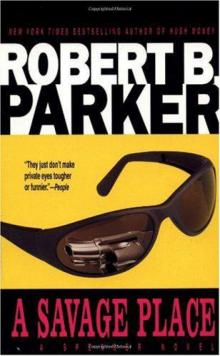 A Savage Place s-8
A Savage Place s-8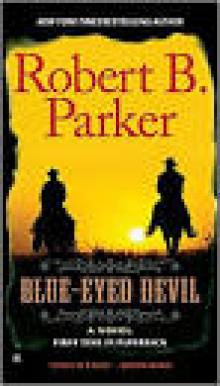 Appaloosa / Resolution / Brimstone / Blue-Eyed Devil
Appaloosa / Resolution / Brimstone / Blue-Eyed Devil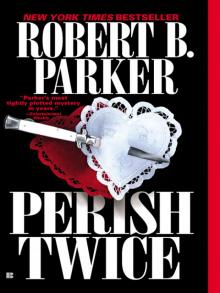 Perish Twice
Perish Twice Spare Change
Spare Change Family Honor
Family Honor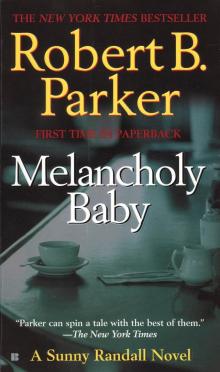 Melancholy Baby
Melancholy Baby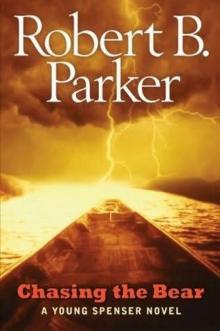 Chasing the Bear
Chasing the Bear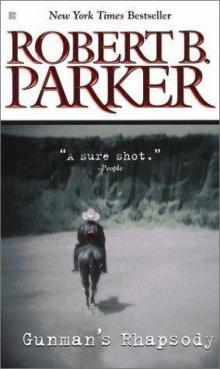 Gunman's Rhapsody
Gunman's Rhapsody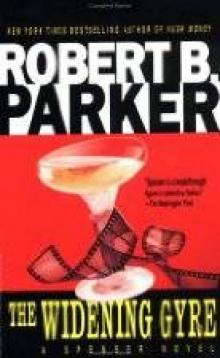 The Widening Gyre
The Widening Gyre Thin Air
Thin Air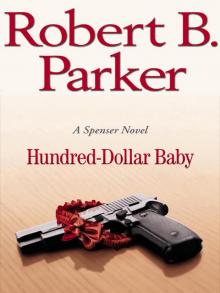 Hundred-Dollar Baby
Hundred-Dollar Baby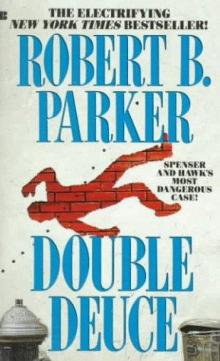 Double Deuce s-19
Double Deuce s-19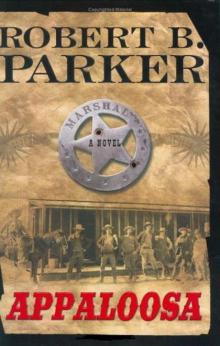 Appaloosa vcaeh-1
Appaloosa vcaeh-1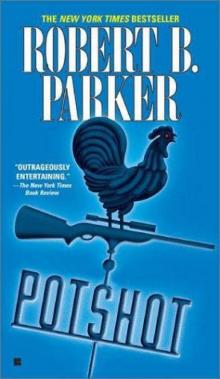 Potshot
Potshot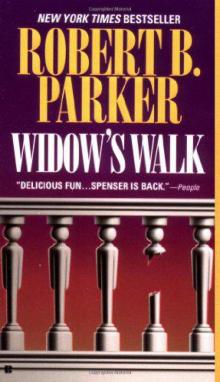 Widow’s Walk s-29
Widow’s Walk s-29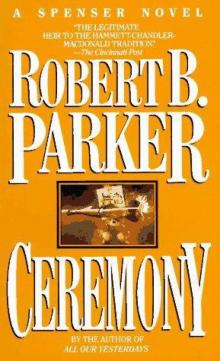 Ceremony s-9
Ceremony s-9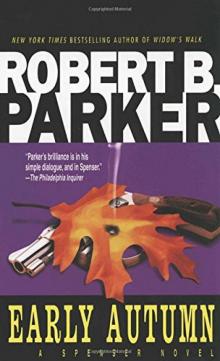 Early Autumn
Early Autumn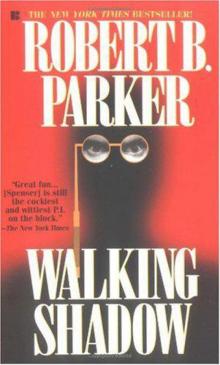 Walking Shadow s-21
Walking Shadow s-21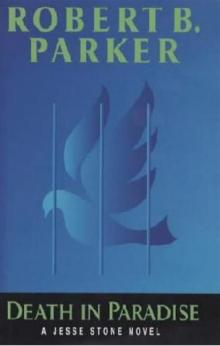 Death In Paradise js-3
Death In Paradise js-3 Shrink Rap
Shrink Rap Blue-Eyed Devil
Blue-Eyed Devil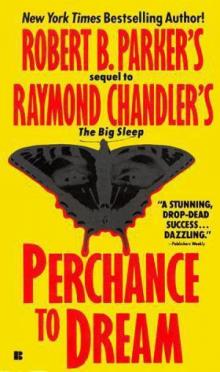 Perchance to Dream
Perchance to Dream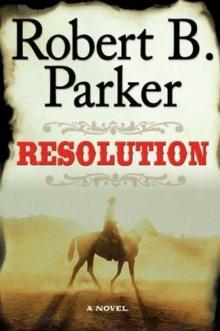 Resolution vcaeh-2
Resolution vcaeh-2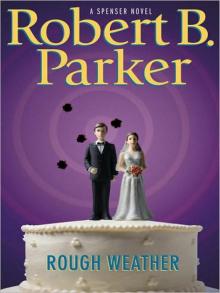 Rough Weather
Rough Weather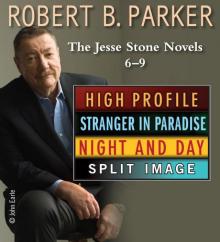 The Jesse Stone Novels 6-9
The Jesse Stone Novels 6-9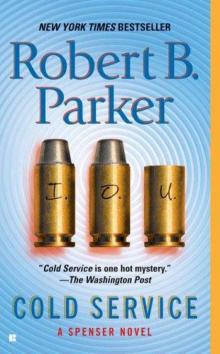 Cold Service s-32
Cold Service s-32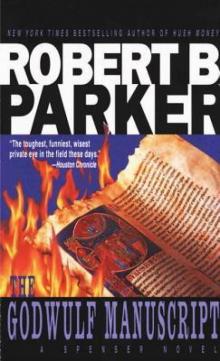 The Godwulf Manuscript
The Godwulf Manuscript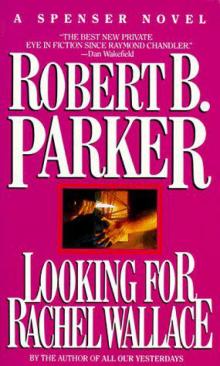 Looking for Rachel Wallace s-6
Looking for Rachel Wallace s-6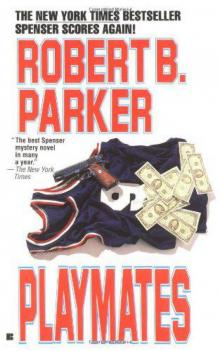 Playmates s-16
Playmates s-16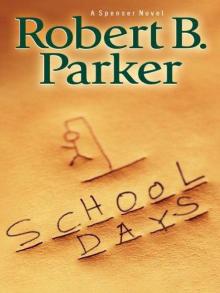 School Days s-33
School Days s-33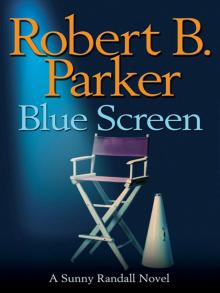 Blue Screen
Blue Screen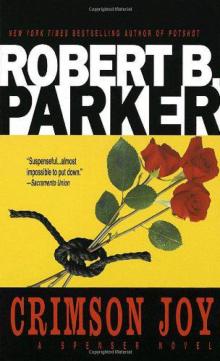 Crimson Joy
Crimson Joy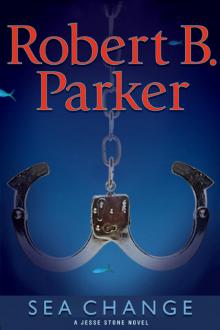 Sea Change js-5
Sea Change js-5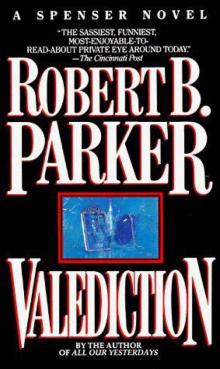 Valediction s-11
Valediction s-11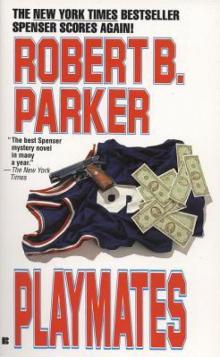 Playmates
Playmates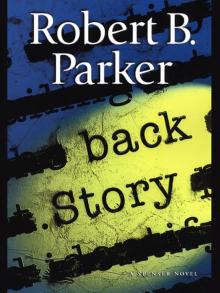 Back Story
Back Story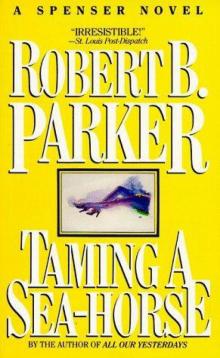 Taming a Sea Horse
Taming a Sea Horse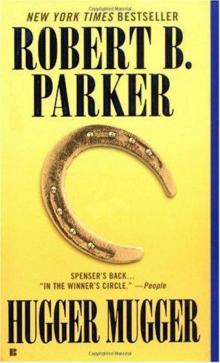 Hugger Mugger
Hugger Mugger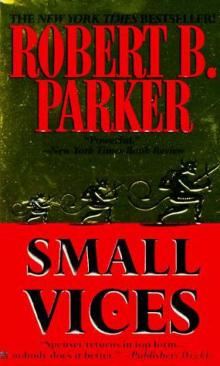 Small Vices s-24
Small Vices s-24 Silent Night: A Spenser Holiday Novel
Silent Night: A Spenser Holiday Novel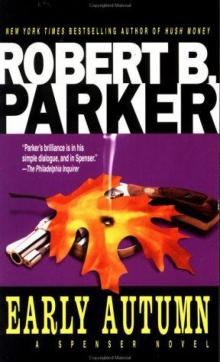 Early Autumn s-7
Early Autumn s-7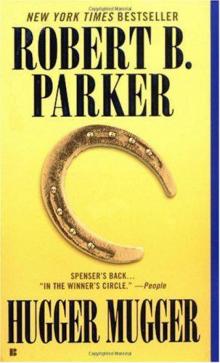 Hugger Mugger s-27
Hugger Mugger s-27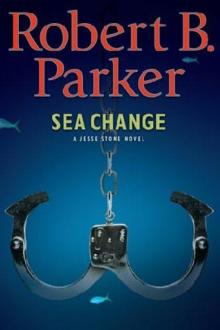 (5/10) Sea Change
(5/10) Sea Change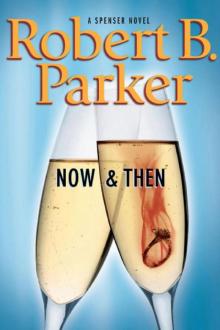 Now and Then
Now and Then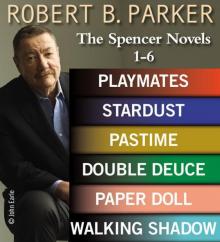 Robert B. Parker: The Spencer Novels 1?6
Robert B. Parker: The Spencer Novels 1?6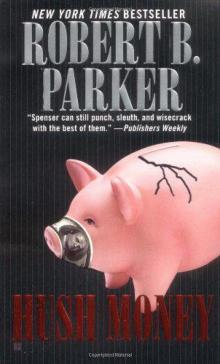 Hush Money s-26
Hush Money s-26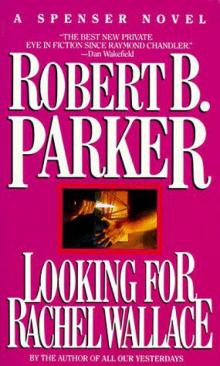 Looking for Rachel Wallace
Looking for Rachel Wallace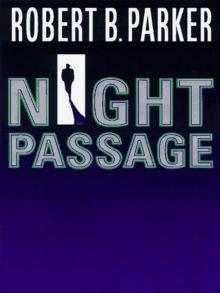 Night Passage
Night Passage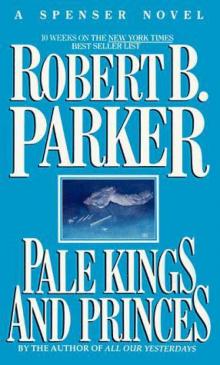 Pale Kings and Princes
Pale Kings and Princes All Our Yesterdays
All Our Yesterdays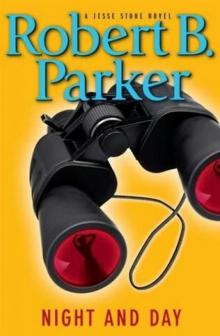 Night and Day js-8
Night and Day js-8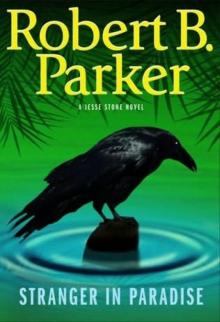 Stranger in Paradise js-7
Stranger in Paradise js-7 Double Play
Double Play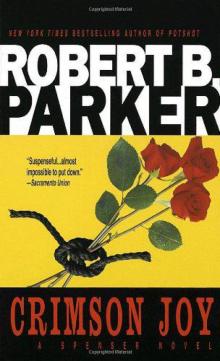 Crimson Joy s-15
Crimson Joy s-15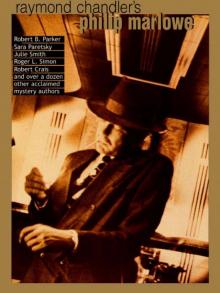 Raymond Chandler's Philip Marlowe
Raymond Chandler's Philip Marlowe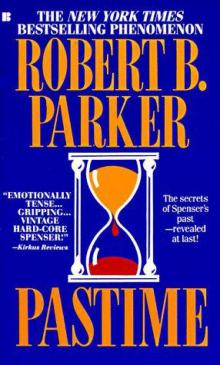 Pastime
Pastime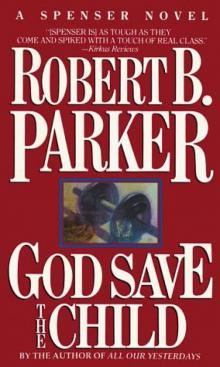 God Save the Child s-2
God Save the Child s-2 Bad Business
Bad Business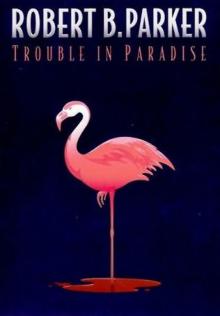 Trouble in Paradise js-2
Trouble in Paradise js-2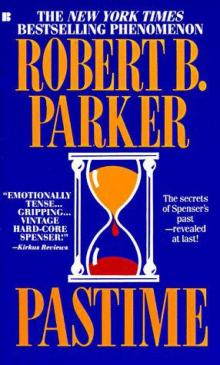 Pastime s-18
Pastime s-18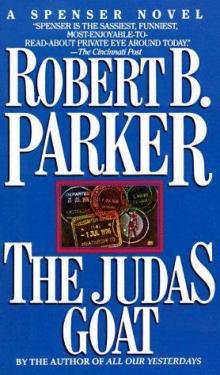 The Judas Goat s-5
The Judas Goat s-5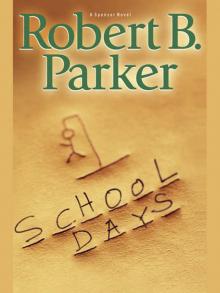 School Days
School Days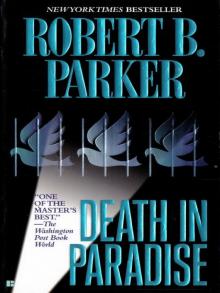 Death In Paradise
Death In Paradise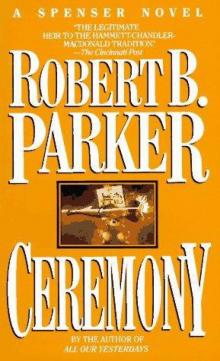 Ceremony
Ceremony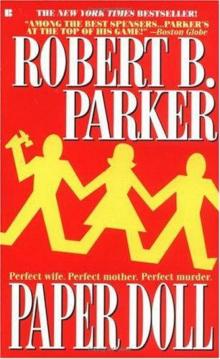 Paper Doll s-20
Paper Doll s-20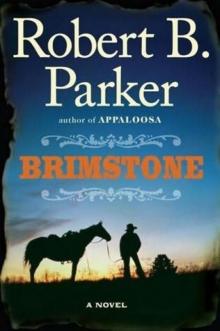 Brimstone vcaeh-3
Brimstone vcaeh-3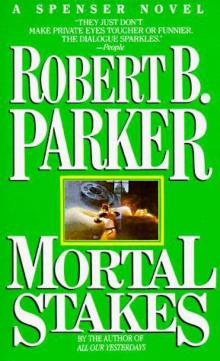 Mortal Stakes s-3
Mortal Stakes s-3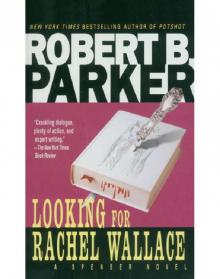 Spencer 06 - Looking for Rachel Wallace
Spencer 06 - Looking for Rachel Wallace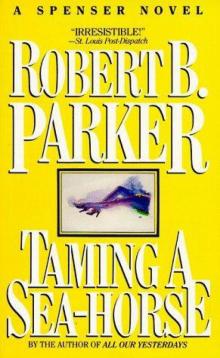 Taming a Sea Horse s-13
Taming a Sea Horse s-13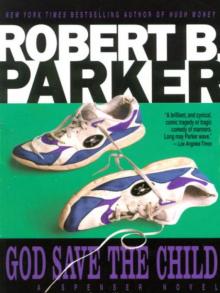 God Save the Child
God Save the Child Chance
Chance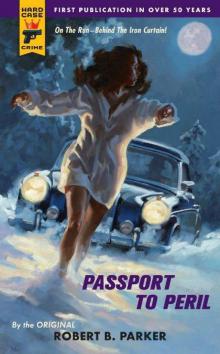 Passport To Peril hcc-57
Passport To Peril hcc-57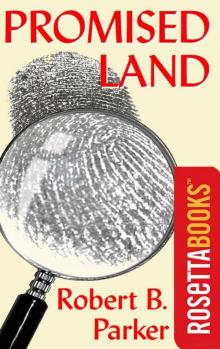 Promised Land
Promised Land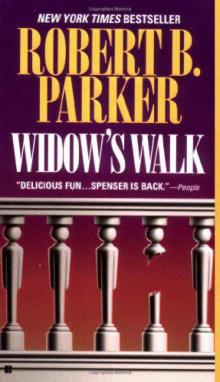 Widow’s Walk
Widow’s Walk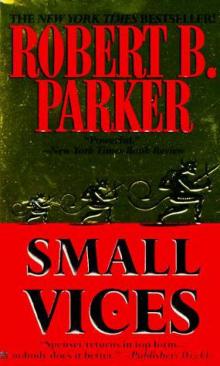 Small Vices
Small Vices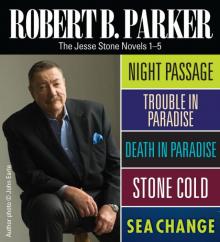 Robert B Parker: The Jesse Stone Novels 1-5
Robert B Parker: The Jesse Stone Novels 1-5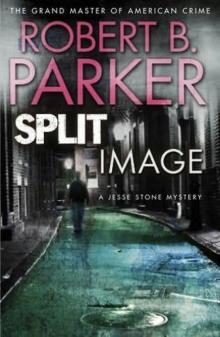 Split Image js-9
Split Image js-9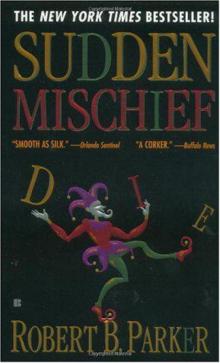 Sudden Mischief s-25
Sudden Mischief s-25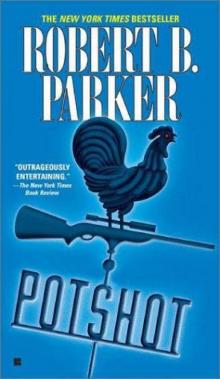 Potshot s-28
Potshot s-28 Split Image
Split Image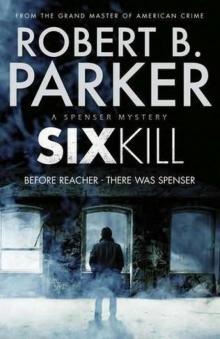 Sixkill s-40
Sixkill s-40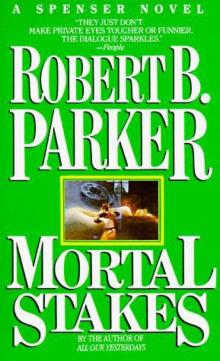 Mortal Stakes
Mortal Stakes Stardust
Stardust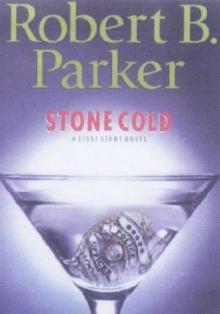 Stone Cold js-4
Stone Cold js-4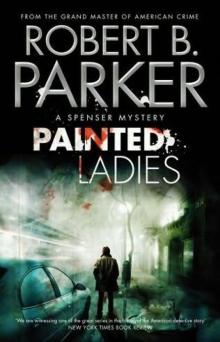 Painted Ladies s-39
Painted Ladies s-39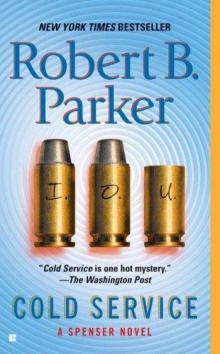 Cold Service
Cold Service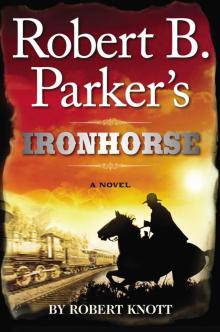 Ironhorse
Ironhorse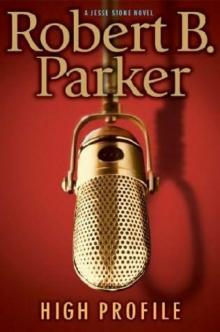 High Profile js-6
High Profile js-6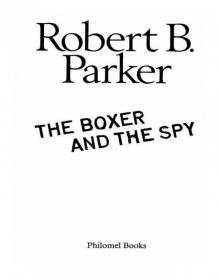 The Boxer and the Spy
The Boxer and the Spy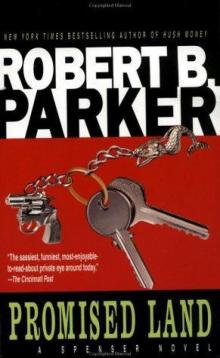 Promised Land s-4
Promised Land s-4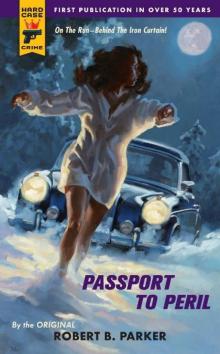 Passport to Peril (Hard Case Crime (Mass Market Paperback))
Passport to Peril (Hard Case Crime (Mass Market Paperback))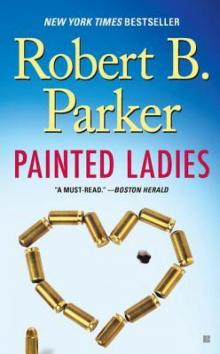 Painted Ladies
Painted Ladies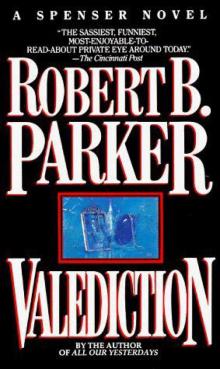 Valediction
Valediction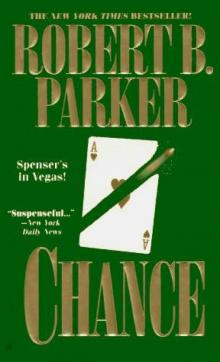 Chance s-23
Chance s-23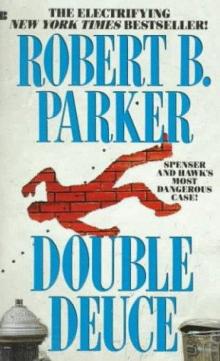 Double Deuce
Double Deuce Wilderness
Wilderness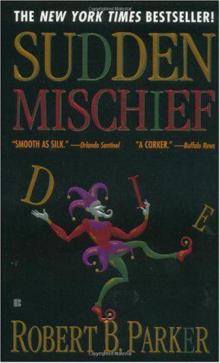 Sudden Mischief
Sudden Mischief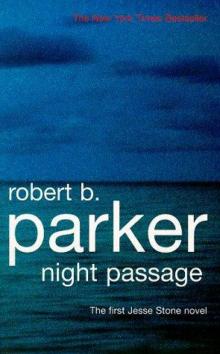 Night Passage js-1
Night Passage js-1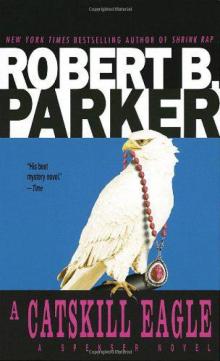 A Catskill Eagle
A Catskill Eagle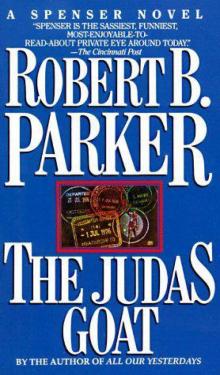 The Judas Goat
The Judas Goat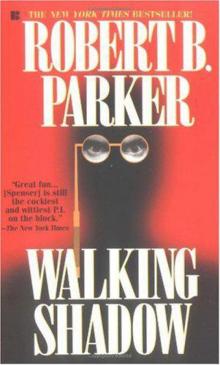 Walking Shadow
Walking Shadow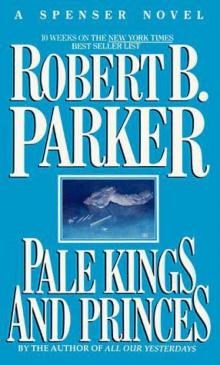 Pale Kings and Princes s-14
Pale Kings and Princes s-14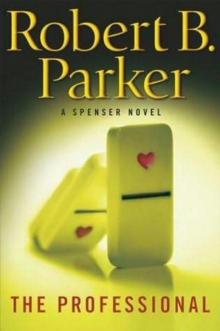 The Professional
The Professional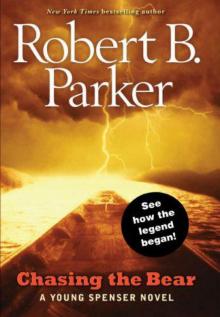 Chasing the Bear s-37
Chasing the Bear s-37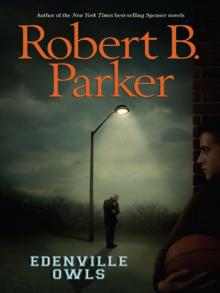 Edenville Owls
Edenville Owls Sixkill
Sixkill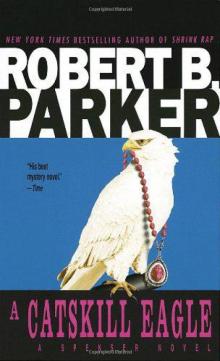 A Catskill Eagle s-12
A Catskill Eagle s-12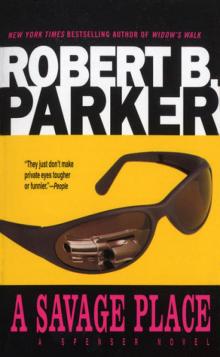 A Savage Place
A Savage Place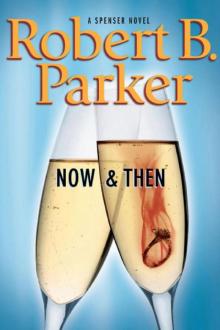 Now and Then s-35
Now and Then s-35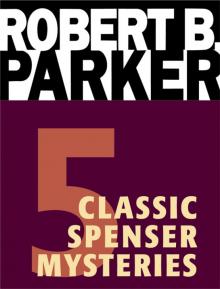 Five Classic Spenser Mysteries
Five Classic Spenser Mysteries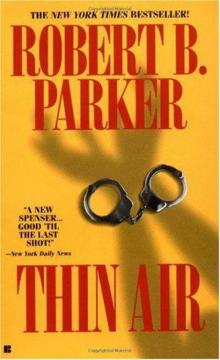 Thin Air s-22
Thin Air s-22